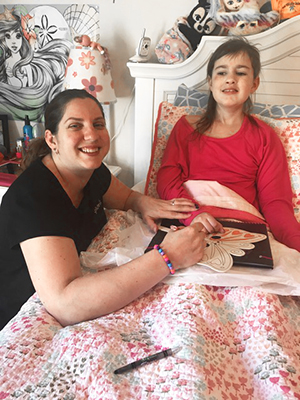Giving Children Control in Their Care Choices

Families facing a terminal prognosis for their child are faced with an impossible choice: to continue treatments—grasping at any hope for a cure even when those treatments cause their own pain and devastation, or give up hope for a cure and focus on comfort care and pain management. Nothing can take away the agony of having to make that decision, but Gilchrist’s child life specialists work to ease that pain and help parents find the best path for their family and their child.
But what about the child’s wishes? As children grow, they are developing their own identity, personality and preferences through a myriad of small decisions. Yet most decisions are left to parents. Parents decide what a child eats for dinner, where they live, where they worship and go to school, even what music gets played in the car. A sick child has even less autonomy. Their experience is one of hospital stays and medication regimens, with their own body betraying them and preventing a normal experience of school and play—sometimes even robbing them of physical command of their own body.
Parents make the best decisions they can by relying on the wisdom of experience and love for their children. They battle demons, research, soul search and lose sleep—all to find a way out of the mess of illness. Yet rarely, in my experience, do parents have conversations with their children about their disease and treatment options. This may be because of the parents’ own confusion or fear, the desire to protect their child or the belief that these conversations are too scary, too sad or too much for any child to process.
As a child life specialist, one of my roles is to help our youngest patients find some sense of control and empowerment, even when it seems gone. When a child feels helpless, often the best way to combat that is to help them find a sense of control or mastery over something small. A 3-year-old may not be able to put their shoes on, but they can choose which color shirt they want to wear. For children facing their own mortality, no fear is small, no idea unimportant. Their need to be heard is so much greater, and they often want someone to address the nebulous things they are afraid of, but don’t know how to ask.
Child life is often seen as play, helping children maintain a sense of fun and adventure, even when they are bedbound, nonverbal or in pain. Helping a bed-bound child see themselves as a pirate captain on the high seas or finding ways for a child struggling with speech to sing silly songs can be invaluable and give them joy. But giving a child the tools to help them tell the world what they want and need is priceless.
In adult medical care, patients fill out advance directives—forms that are legally binding, naming people to make medical decisions for them if they can’t, and clearly stating how far they want treatment to proceed in dire circumstances. But did you know there are variations for children too?
My Wishes, Voicing My Choices, and other “advance directives” aimed at children have no legal status. Yet they are one of the greatest tools for any sick child. I call them my “Magic Books.” With these, our pediatric patients can let their families and their care staff know what is most important to them. They are books of simple questions, such as “How do I want to be treated?” and “What do I want people to know? They can say who needs to be around, what helps make them less afraid, even if they want to be alert despite maybe hurting a little, or in no pain, even if the medicine makes them fall asleep. These tools give a child a voice in their own treatment, helping them feel powerful, that they’ve had their say, and that people are listening.
Gilchrist’s child life specialists are often the go-betweens for children and parents. Both parents and children want to protect each other and, as a result, often leave things unsaid. If I can help open those conversations, ease the fears of the child and the parent, and help that child feel their fears are being recognized and responded to and that their wishes are heard, suddenly that child feels like a superhero. And when that happens, so do I.
To learn more about Gilchrist, visit: gilchristcares.org.


